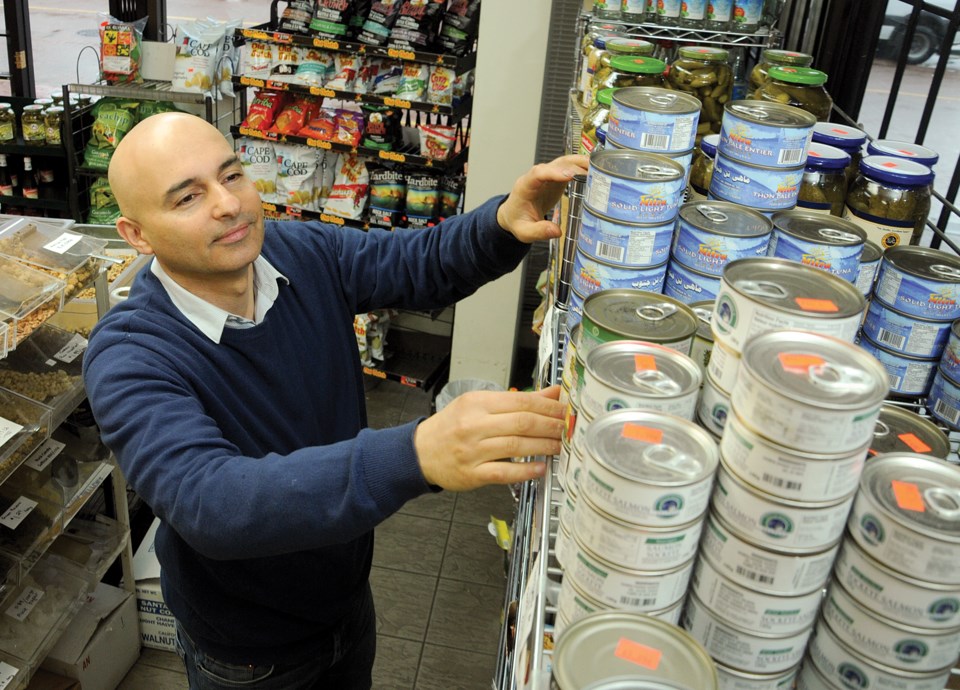Members of the North Shore’s sizeable Persian community are welcoming news the Canadian government will drop sanctions that halted imports and exports from Iran – but not because they’re eager to see their favourite brand of pickles back on the shelves.
Global Affairs Canada announced last week the unfreezing of financial services and trade with Iran – sanctions which were originally put in place by the Conservatives in 2013 – as a result of Iran fulfilling its commitments to the International Atomic Energy Agency on halting its nuclear program.
Sam Garman, owner of Mitra Bulk Food and Deli in Ambleside, said the move ought to be a win for Canadians and the people of Iran. “It’s great for everybody,” he said.
Garman said it may mean lower prices for some Iranian products in his store, but the real economic imperative is allowing large Canadian businesses to do business in Iran – one business in particular.
Shortly after the United States and European Union dropped their sanctions last month, Iran purchased 116 Airbus jets and announced it was looking to purchase up to 400 more planes, including from Quebec’s Bombardier, which is trying to stave off bankruptcy.
“That’s billions of dollars. That creates a lot of jobs for a lot of people,” Garman said. “Canada fell behind and everybody knew that.”
Pamela Goldsmith-Jones, West Vancouver-Sunshine Coast-Sea to Sky Country MP and parliamentary secretary for foreign affairs, said, “The sanctions basically operated to bring Iran to the negotiating table.
“By January 16, our allies had lifted their sanctions and so, for us, we are both aligning with our allies and also wishing to constructively, cautiously, re-engage with Iran in terms of economy opportunity.”
Goldsmith-Jones said it will also be easier for Canadians to send money to family in Iran, although Garman, who is also a licensed Realtor, said money is more likely to be flowing in the other direction, especially from developers eager to do business here.
“From what I see, everybody’s trying to build something here and they can’t because they couldn’t bring the money in. That should make it much easier for them to get involved in the industry,” he said.
Nick Hosseinzadeh, a North Vancouver resident and Iranian politics watcher, said it is a positive move from a humanitarian standpoint, although he said sanctions from the European Union had the biggest impact, as Canada was doing very little business with Iran prior to 2013.
“(The sanctions) hurt the (Iranian) government to an extent but what it really comes down to is it hurts the ordinary people,” he said, noting the currency bottomed out while the price of food and unemployment spiked. “Certain medicines were hard to buy for people. You never want a situation like that.”
Still, Hosseinzadeh said it was refreshing to see the rest of the world resolve a problem in the Middle East with diplomacy, even with a pariah state that is in many ways still isolating itself from the West.
“The Iranian government is still one you can’t entirely trust. They do sponsor some groups that are recognized as terrorist groups and there’s no denying that but the approach of not directly engaging with Iran as we’ve seen wasn’t a very prudent one,” he said.
The Canadian government still condemns Iran’s human rights record, aggressive rhetoric towards Israel and efforts to destabilize the region, Goldsmith-Jones said.
But, there’s something of an ideological shift between her government and the previous one when it comes to international relations, she added.
“We feel… very, very strongly that you have to keep talking even to those you don’t agree with. That’s what diplomacy means. It’s the only way to make inroads,” she said.



